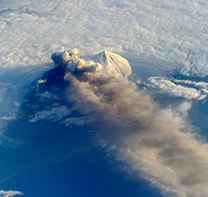Second Meeting on the Inter-comparison of Satellite-based Volcanic Ash Retrieval Algorithms within WMO SCOPE-Nowcasting
8 October - 12 October 2018
INGV
Catania, Italy
Agenda Version 2018-09-24
Monday, 8 October
1. Background, Goals, and Next Generation Satellites
(Chairs: Stefano Corradini, INGV and Mike Pavolonis, NOAA)
13:30-14:00: Registration
14:00-14:15: 1.1 Welcome and practical information (INGV)
14:15-14:30: 1.2 Role of Volcanic Ash Inter-comparison within WMO (Toshi Kurino, WMO)
14:30-14:45: 1.3 Relevance to ICAO Met Panel (Dave Schneider, USGS)
14:45-15:00: 1.4 Objectives of WMO SCOPE-Nowcasting Volcanic Ash Inter-comparison (Mike Pavolonis, NOAA)
15:00-15:20: 1.5 Volcano Observatory View: INGV (Simona Scollo, INGV)
15:20-15:45: Coffee break (included in registration fee)
15:45-16:00: 1.6 Impact of next generation satellites: Himawari-8 (Toshiyuki Kitajima, JMA)
16:00-16:15: 1.7 Impact of next generation satellites: FY4 (Lin Zhu, CMA)
16:15-16:30: 1.8 Impact of next generation satellites: MTG and MetOp-SG (Alessandra Cacciari, EUMETSAT)
16:30-16:45: 1.9 Impact of next generation satellites: GOES-R and JPSS (Mike Pavolonis, NOAA)
16:45-17:00: 1.10 Discussion on impacts of next generation satellites
17:00-18:00: 1.11 Poster Session
Tuesday, 9 October
2. Validation Sources, Inter-comparison Results, and Product Overviews
(Chair: Luca Merucci, INGV)
09:00-09:20: 2.1 MISR (Verity Flower, NASA - remote presentation capabilities still need to be confirmed)
09:20-09:40: 2.2 CALIOP volcanic ash products (Jay Kar, NASA) 09:40-10:00: 2.3 Exploitation of GPS (Massimo Aranzulla, INGV)
10:00-10:20: 2.4 Dispersion Model Satellite Needs (Larry Mastin, USGS) 10:20-10:40: Coffee break (included in registration)
10:40-12:30: 2.5 Intercomparison results and discussion (Gareth Thomas)
Key Discussion Questions (Moderator: Dave Schneider, USGS):
- - How does the quality of ash products vary as a function of satellite sensor, algorithm, and scene?
- - What have we learned since 2015?
- - What are the impacts of next generation sensors?
- - How do computer algorithms compare with human expert analysis?
12:30-13:30: Lunch (included in registration fee) Advances in Satellite Algorithms (speakers are encouraged to include relevant inter-comparison results in their talks; algorithm details should be presented in posters)
13:30-13:50: 2.6 Product Development at INGV (Stefano Corradini and Luca Merucci, INGV)
13:50-14:10: 2.7 Product Development at DLR (Margarita Vazquez, DLR)
14:10-14:30: 2.8 Product Development at EUMETSAT (Alessandra Cacciari, EUMETSAT)
14:30-14:50: 2.9 Product Development at CMA (Zhu Lin, CMA)
14:50-15:20: Coffee break (included in registration fee)
15:20-15:40: 2.10 Product Development at Oxford (Elisa Carboni, Oxford)
15:40-16:00: 2.11 Product Development at UK Met Office (Mike Cooke, UKMO)
16:00-16:20: 2.12 Product Development at Australian Bureau of Meteorology (Chris Lucas, BoM)
16:20-16:40: 2.13 Product Development at KNMI (Jos de Laat, KNMI)
16:40-17:00: 2.14 Product Development at University of Bristol (Luke Western, University of Bristol)
Wednesday, 10 October
Field Excursion - Etna
Thursday, 11 October
Product Overviews (continued) and Product Quality Assessment for Operational Applications
(Chair: Dave Schneider, USGS)
09:00-09:20: 4.1 Product Development at NOAA (Mike Pavolonis, NOAA)
09:20-09:40: 4.2 Lessons Learned from Synthetic Data Retrievals (Stefano Corradini, INGV)
09:40-10:30: 4.3 Discussion on Synthetic Data Analysis 10:30-11:00: Coffee break (included in registration)
11:00-12:30: 4.4 Discussion on automated volcanic ash detection (Moderator: Dave Schneider)
Key questions:
- - Can automated satellite algorithms consistently detect eruptive clouds in a timely manner?
- - How have next generation satellites impacted eruption detection (cite relevant examples)?
- - How well do automated algorithms track clouds that may contain volcanic ash from emergence through dissipation?
- - How have next generation satellites impacted volcanic ash tracking (cite relevant examples)?
- - What are the remaining challenges?
12:30-13:30: Lunch (included in registration fee)
13:30-13:50: 4.5 Exploitation of microwave measurements (Frank Marzano)
13:50-15:00: 4.6 Discussion on satellite retrievals of ash cloud properties
(Moderator: Dave Schneider)
Key questions:
- - How have next generation satellites impacted volcanic ash cloud characterization (cite relevant examples)?
- - Are automated algorithms sufficiently accurate, over a broad range of cases, to support a risk based approach to ash avoidance?
- - How should uncertainty be characterized?
- - What type of post-processing (e.g. space and time compositing, blending of information from multiple sensors) can be done to mitigate limitations?
- - How can GEO and LEO measurements be combined?
- - How resistant are algorithms to measurement artifacts?
- - Are automated algorithms sufficiently accurate, over a broad range of cases, to support forecasting applications (inverse modeling, data insertion, eruption source parameter estimation, verification)?
- - How should satellite products be combined with non-satellite products in support of improving operational capabilities?
- - What needs to be done to prepare Volcanic Ash Advisory Centers for routinely utilizing quantitative satellite products?
- - What needs to be done to prepare modeling groups for routine utilization of quantitative satellite products?
- - What are the remaining challenges?
- - Are there special cases where quantitative characterization may not be possible? If so, what are those special cases?
- - How can volcanic ash and SO2 products be used in a complementary manner?
15:00-15:30: Coffee break (included in registration fee)
15:30-17:00: 4.7 Discussion on satellite retrievals of ash cloud properties - development of a consensus road map for addressing remaining challenges (Moderator: Dave Schneider)
Friday, 12 October
5. Product Quality Assessment for Operational Applications (continued)
(Chair: Toshi Kurino, WMO)
09:00-10:30: 5.1 Discussion: Refinement of Conclusions
10:30-11:00: Coffee break (included in registration fee)
11:00-12:30 5.2 Discussion: Review of Conclusions and Future Plans (paper?)
12:30-13:30 Lunch (included in registration fee)
